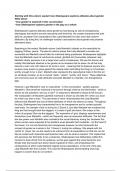Lecture notes
GCSE English Literature Grade 9 Essay on Gender In Macbeth
Exemplar GCSE English Literature Grade 9 essay on Gender in Macbeth. Macbeth, Lady Macbeth, Malcolm, Macduff, and the Witches are discussed, using quotations and an in-depth analysis. Key themes such as the supernatural, violence, and gender are explored within additionally.
[Show more]



